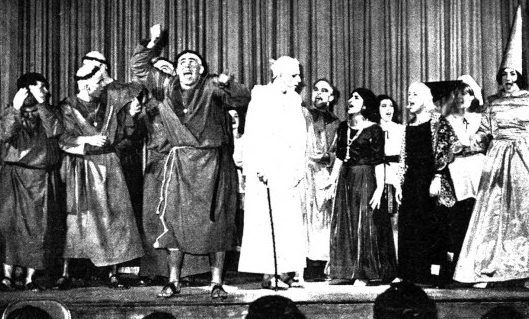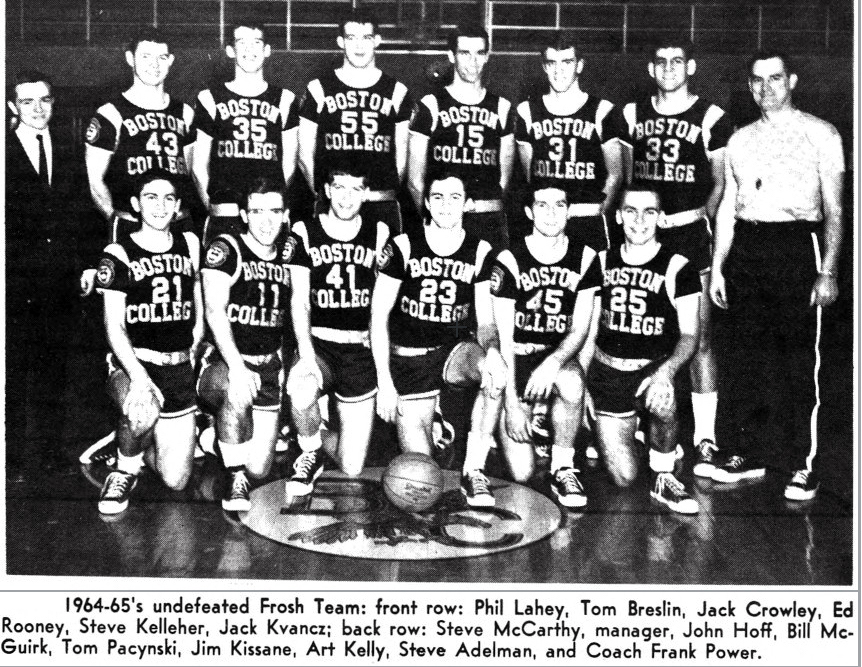Spring semesters were in full swing in March, and winter sports were wrapping up their seasons, often in post-season tournaments. Here’s some of what happened on campus . . . and in the outside world . . . in March each of the years we were at BC. (My apologies for this post not appearing earlier. My daughter, son-in-law, and two granddaughters arrived late February from New Hampshire for a visit and my schedule was pleasantly discombobulated. They are here an extra two days because the current New England storm resulted in cancellation of their original flight. :) )
On campus
1965
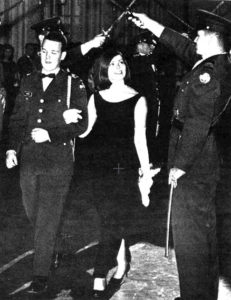
A member of the Kaydette court and a ROTC cadet exchange admiring glances at the 1965 Military Ball.
The March 12 edition of The Heights had a page one article reporting that the Campus Council had approved a “University Activities Fee” of $5 . . . per year. Our classmates on the basketball and hockey teams finished their seasons. Heights reported the frosh hoop team went 20-0, while the freshman hockey team finished with a 14-4 slate. The March 19 edition led with the news that two contingents of BC students had arrived in Alabama to participate in activities sponsored by the Southern Christian Leadership Conference (SCLS), headed by Dr. Martin Luther King.
1966
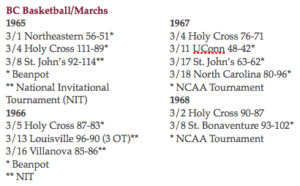 In the March 4 edition, The Heights celebrated the national collegiate record for consecutive hours broadcasting on radio set by “Jerry Reynolds,” otherwise known to the registrar as classmate Bill McTague, CBA, the Sunday before on WVBC. “Reynolds” spent three days on the air. The chair of the Committee on Day Student Affairs sent a letter to The Heights complaining about that classes were held the previous Friday during a snow storm that produced “treacherous driving conditions.” “No Go in Snow” said BC had shown “a disregard for the interests of the two-thirds of BC students who commuted.
In the March 4 edition, The Heights celebrated the national collegiate record for consecutive hours broadcasting on radio set by “Jerry Reynolds,” otherwise known to the registrar as classmate Bill McTague, CBA, the Sunday before on WVBC. “Reynolds” spent three days on the air. The chair of the Committee on Day Student Affairs sent a letter to The Heights complaining about that classes were held the previous Friday during a snow storm that produced “treacherous driving conditions.” “No Go in Snow” said BC had shown “a disregard for the interests of the two-thirds of BC students who commuted.
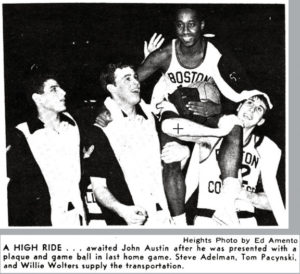 BC students and others honored basketball great John Austin at his last home game on February 25. Classmate Reid Oslin wrote an appreciation of Austin in The Heights that day. Austin’s final home game was somewhat typical. The Eagles trounced Seton Hall 122-77. John left the game with 10+ minutes left, an ankle injury, and 31 points. Senior captain Ed Hockenbury was also honored. Classmate Ed Hattauer was instrumental in making the arrangements for the ceremonies. Concerns about the food in McElroy? Nah. The March 25 edition of The Heights carried a report that allayed all concerns. According to the head of the Newton Board of Health, McElroy operated “one of the finest kitchens in Newton.” So there. The headline says much: “Local Paper Cites Wild Off-Campus BC Parties.” Where?!
BC students and others honored basketball great John Austin at his last home game on February 25. Classmate Reid Oslin wrote an appreciation of Austin in The Heights that day. Austin’s final home game was somewhat typical. The Eagles trounced Seton Hall 122-77. John left the game with 10+ minutes left, an ankle injury, and 31 points. Senior captain Ed Hockenbury was also honored. Classmate Ed Hattauer was instrumental in making the arrangements for the ceremonies. Concerns about the food in McElroy? Nah. The March 25 edition of The Heights carried a report that allayed all concerns. According to the head of the Newton Board of Health, McElroy operated “one of the finest kitchens in Newton.” So there. The headline says much: “Local Paper Cites Wild Off-Campus BC Parties.” Where?!
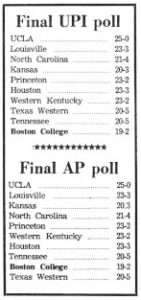 1967
1967
A page 6 article in the March 3 Heights analyses the current situation about “Girls in A&S.” President Walsh had said it would take four years to make it happen. He was just about correct. Same issue carried a feature on the fraternities in CBA. Classmate Phil DiBelardino did a review of the School of Ed skits.
1968
Lead article in the March 5 edition of The Heights reported that BC, “in an effort to cut across racial lines in it selection of students,” had set aside $100,000 as a recruitment and scholarship fund “primarily for Negroes (sic) of the Greater Boston area.” A brief item in the March 12 edition says BC fans will have something new to cheer about at football games — “lithe, lovely majorettes.”
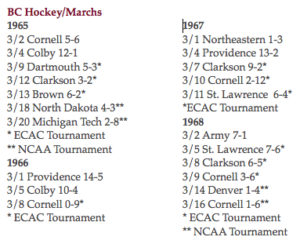 Once again, classmate Phil DiBelardino reports on the School of Ed skits and a sweep honors by the Senior class. That’s us! In signs that “the end is near,” an article in the March 19 edition lays out the plan for “Senior Week activities for the class of 1968.” The same issue provided a feature on “A man of quiet protest” — Francis Sweeney, SJ. Another person “of protest,” but perhaps not so quiet, is referenced in an article about Theology Professor Mary Daly’s book The Church and The Second Sex. Women athletes make the sports page of The Heights with an article on the “Eaglettes'” win in basketball over Jackson College, 45-16. The team was captained by classmate Judy Young. The March 26 Heights announced the upcoming “Day of Conscience” on campus to address issues of war and racism.
Once again, classmate Phil DiBelardino reports on the School of Ed skits and a sweep honors by the Senior class. That’s us! In signs that “the end is near,” an article in the March 19 edition lays out the plan for “Senior Week activities for the class of 1968.” The same issue provided a feature on “A man of quiet protest” — Francis Sweeney, SJ. Another person “of protest,” but perhaps not so quiet, is referenced in an article about Theology Professor Mary Daly’s book The Church and The Second Sex. Women athletes make the sports page of The Heights with an article on the “Eaglettes'” win in basketball over Jackson College, 45-16. The team was captained by classmate Judy Young. The March 26 Heights announced the upcoming “Day of Conscience” on campus to address issues of war and racism.
The outside world
1965
Operation Rolling Thunder, the daily bombing of North Vietnam by US and allied forces, began March 2. The movie The Sound of Music had its premiere on the same day. Sunday, March 7, saw the implementation of various changes in the Roman Catholic Mass brought about by the Vatican Council. On that same Sunday, members of the Alabama Highway Patrol violently broke up a demonstration by civil rights protestors in Selma, Ala. It was the American civil rights movement’s “Bloody Sunday.” The 9th Marine Expeditionary Brigade, with 1,400 men, came ashore in Da Nang on March 8, becoming the first American military combat troops in South Vietnam. The first “T.G.I. Friday” restaurant opened in New York City on March 15. On March 20, President Lyndon Johnson federalized the Alabama National Guard and authorized the use of US Army troops to protect civil rights marchers between Selma and Montgomery, Ala. Martin Luther King Jr. and 25,000+ civil rights marchers successfully ended their march to Montgomery, Ala., on March 25. The peaceful nature of the events ended tragically later that same day, when participant Viola Luzzo, a mother of five, was shot dead by a sniper.
1966
In an interview published on March 4, Beatle John Lennon was quoted as saying, “We’re more popular than Jesus now.” That statement later led to protests in the US and the burning of Beatles records. Stephen Martin, a baseball player at Tulane, became the first African-American to play a varsity sport in the Southeastern Conference (SEC) when he took the field on March 7. It was also Tulane’s last season as a member of the SEC. On March 19, the Texas Western University Miners, featuring a starting lineup of five African-Americans, defeated the all-white and #1-ranked Kentucky Wildcats, 72-65, to win the NCAA basketball championship. Protestors in dozens of American cities marched against the Vietnam War on March 26.
1967
The week ending March 4 was the bloodiest for US troops in Vietnam since the war began. A total of 232 men were killed and 1,381 wounded. CBS Reports broadcast on March 7 “The Homosexuals,” becoming the first national television show to report on issues related to gays and lesbians. That same day, Alice B. Toklas, partner of Gertrude Stein, died in Paris. The first demonstration of “slow motion instant replay,” showing ski racers, took place on ABC Wide World of Sports on March 18. Despite his request to stay, noting that “prison had become my home,” Charles Manson was released from prison in California. Florida became the first two-party state in the South after elections on March 28. Republicans, for the first time, gained more than 1/3 of legislative seats, preventing Democrats from vetoing actions of the Republican governor. Jimi Hendrix set fire to his guitar for the first time in a March 31 performance. He was taken to the hospital with burns on his hands. He got better at that facet of his performance.
1968
The final episode of Lost in Space aired on March 6. Rock music promotor Bill Graham opened Fillmore East on March 8. President Lyndon Johnson won, but failed to win a majority of the vote in the March 12 New Hampshire Democratic primary for president. US Sen. Eugene McCarthy, who opposed the Vietnam War, received 42 percent of the vote. The “child-proof” cap for medicine containers made its debut on March 14. Though not known publicly until more than a year later, the My Lai Massacre occurred on March 16. US troops killed 504 women, children, and elderly men. Also that day, US Senator Robert F. Kennedy entered the race for president. It was announced on March 22 that US Army General William Westmoreland, who had headed US operations in Vietnam since 1964, would be withdrawn from that post, effective July 2. About 150 students at Columbia University seized an administration building on March 27 and occupied it briefly, in protest of university links to the US military. In a nationwide address on March 31, President Lyndon Johnson announced he would not run for re-election.

